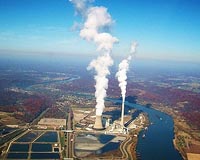 |
Paris (AFP) Oct 16, 2010 Grim news, few options and a fierce haggle await the 193 members of the UN's Convention on Biological Diversity (CBD) in Nagoya on Monday as they debate how roll back a looming, man-made mass extinction. Dogging the 12-day conference in Japan is the wreckage of a promise that, in 2010, the much-ballyhooed International Year of Biodiversity, UN members would significantly brake species loss. Instead, the reverse has happened -- and the health of some key ecosystems that nourish human life, such as coral reefs and the tropical rainforest, is at threat. In 2007, Earth's 6.8 billion humans were living 50 percent beyond the planet's biocapacity, according to a new assessment by green group WWF. "Even with modest UN projections for population growth, consumption and climate change, by 2030 humanity will need the capacity of two Earths to absorb CO2 waste and keep up with natural resource consumption," it said. If everyone used resources at the same rate per capita as the United States or the United Arab Emirates, 4.5 planets would be needed. Habitat loss, over-exploitation, global warming, hunting, invasive species and misuse of freshwater are driving thousands of species to the brink. According to the International Union for Conservation of Nature (IUCN), 869 species out of 44,838 species on its famous Red List are already extinct or extinct in the wild. They could be joined nearly 17,000 others on current trends. A quarter of mammal, a third of amphibians, a fifth of plant species and one bird species in eight could go the way of the dodo. The worldwide appetite for tackling environmental crises has dulled in the light of economic recession, which is darkening hopes for Nagoya. Three big issues are on the conference table: -- setting down 2020 as the new target for curbing species loss; -- boosting medium-term financial help for poor countries to help them protect their wildlife and -- forging an accord called the Access and Benefits Sharing (ABS) Protocol. In essence, poor countries would get a sort of "gene fee" if scientists find unique plants or animals that have a commercial use, say in pharma, cosmetics or energy. The ABS Protocol could be the question that makes or breaks Nagoya, say experts. The scheme shines in the halo of innovation, just as it is darkened by doubts that it is workable. "For us, it is not acceptable to go to Nagoya and not have an agreement for (the) ABS Protocol," Brazilian Environment Minister Izabella Teixeira warned this month. "(...) We need a deal." "It's a core question for the G77," agreed Claudio Chiarolla of the Institute for Sustainable Development and International Relations (IDDRI), a Paris thinktank, referring to the Group of 77 and China, a bloc of developing countries. A number of countries in this bloc last month warned of stalling a much-headlined project to set up the biodiversity equivalent to the Nobel-winning Intergovernmental Panel on Climate Change (IPCC). The mooted organisation, known as IPBES, for Intergovernmental Science Policy Platform on Biodiversity and Ecosystem Services (IPBES), would list Earth's species, spell out the value of them and advise policymakers. The G77 hinted that without a deal on the ABS Protocol, it would hold back approving IPBES until after a meeting of the governing council of the UN Environment Programme (UNEP) in February 2011. This position has dismayed many rich countries, already jarred by the catastrophic failure at Copenhagen last December to attack climate change. "The IPBES is the basis for future commitments on biodiversity," France's deputy ecology minister, Chantal Jouanno, told AFP. "It absolutely has to be okayed this year if we want it to be operational in 2011," Jouanno said "If we fail in Nagoya and in the following meeting, where IPBES should be set up, we could inflict a lasting blow to the credibility of international efforts to tackle environmental issues."
Share This Article With Planet Earth
Related Links Our Polluted World and Cleaning It Up
 Fish Near Coal-Fired Power Plants Have Lower Levels Of Mercury
Fish Near Coal-Fired Power Plants Have Lower Levels Of MercuryRaleigh NC (SPX) Oct 13, 2010 A new study from North Carolina State University finds that fish located near coal-fired power plants have lower levels of mercury than fish that live much further away. The surprising finding appears to be linked to high levels of another chemical, selenium, found near such facilities, which unfortunately poses problems of its own. "We found that fish in lakes located at least 30 kilomete ... read more |
|
| The content herein, unless otherwise known to be public domain, are Copyright 1995-2010 - SpaceDaily. AFP and UPI Wire Stories are copyright Agence France-Presse and United Press International. ESA Portal Reports are copyright European Space Agency. All NASA sourced material is public domain. Additional copyrights may apply in whole or part to other bona fide parties. Advertising does not imply endorsement,agreement or approval of any opinions, statements or information provided by SpaceDaily on any Web page published or hosted by SpaceDaily. Privacy Statement |